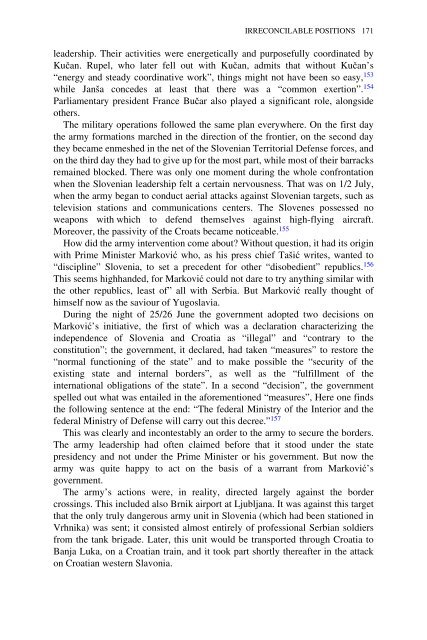Yugoslavia: A History of its Demise - Indymedia
Yugoslavia: A History of its Demise - Indymedia
Yugoslavia: A History of its Demise - Indymedia
Create successful ePaper yourself
Turn your PDF publications into a flip-book with our unique Google optimized e-Paper software.
IRRECONCILABLE POSITIONS 171<br />
leadership. Their activities were energetically and purposefully coordinated by<br />
Kučan. Rupel, who later fell out with Kučan, adm<strong>its</strong> that without Kučan’s<br />
“energy and steady coordinative work”, things might not have been so easy, 153<br />
while Janša concedes at least that there was a “common exertion”. 154<br />
Parliamentary president France Bučar also played a significant role, alongside<br />
others.<br />
The military operations followed the same plan everywhere. On the first day<br />
the army formations marched in the direction <strong>of</strong> the frontier, on the second day<br />
they became enmeshed in the net <strong>of</strong> the Slovenian Territorial Defense forces, and<br />
on the third day they had to give up for the most part, while most <strong>of</strong> their barracks<br />
remained blocked. There was only one moment during the whole confrontation<br />
when the Slovenian leadership felt a certain nervousness. That was on 1/2 July,<br />
when the army began to conduct aerial attacks against Slovenian targets, such as<br />
television stations and communications centers. The Slovenes possessed no<br />
weapons with which to defend themselves against high-flying aircraft.<br />
Moreover, the passivity <strong>of</strong> the Croats became noticeable. 155<br />
How did the army intervention come about Without question, it had <strong>its</strong> origin<br />
with Prime Minister Marković who, as his press chief Tašić writes, wanted to<br />
“discipline” Slovenia, to set a precedent for other “disobedient” republics. 156<br />
This seems highhanded, for Marković could not dare to try anything similar with<br />
the other republics, least <strong>of</strong>” all with Serbia. But Marković really thought <strong>of</strong><br />
himself now as the saviour <strong>of</strong> <strong>Yugoslavia</strong>.<br />
During the night <strong>of</strong> 25/26 June the government adopted two decisions on<br />
Marković’s initiative, the first <strong>of</strong> which was a declaration characterizing the<br />
independence <strong>of</strong> Slovenia and Croatia as “illegal” and “contrary to the<br />
constitution”; the government, it declared, had taken “measures” to restore the<br />
“normal functioning <strong>of</strong> the state” and to make possible the “security <strong>of</strong> the<br />
existing state and internal borders”, as well as the “fulfillment <strong>of</strong> the<br />
international obligations <strong>of</strong> the state”. In a second “decision”, the government<br />
spelled out what was entailed in the aforementioned “measures”, Here one finds<br />
the following sentence at the end: “The federal Ministry <strong>of</strong> the Interior and the<br />
federal Ministry <strong>of</strong> Defense will carry out this decree.” 157<br />
This was clearly and incontestably an order to the army to secure the borders.<br />
The army leadership had <strong>of</strong>ten claimed before that it stood under the state<br />
presidency and not under the Prime Minister or his government. But now the<br />
army was quite happy to act on the basis <strong>of</strong> a warrant from Marković’s<br />
government.<br />
The army’s actions were, in reality, directed largely against the border<br />
crossings. This included also Brnik airport at Ljubljana. It was against this target<br />
that the only truly dangerous army unit in Slovenia (which had been stationed in<br />
Vrhnika) was sent; it consisted almost entirely <strong>of</strong> pr<strong>of</strong>essional Serbian soldiers<br />
from the tank brigade. Later, this unit would be transported through Croatia to<br />
Banja Luka, on a Croatian train, and it took part shortly thereafter in the attack<br />
on Croatian western Slavonia.
















